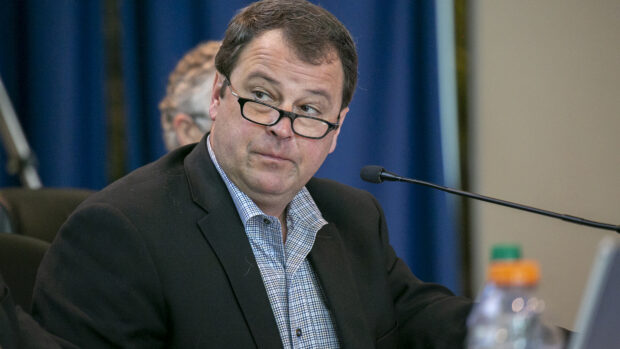(UPDATED, 5:20 p.m., to clarify nature of discussions between Gov. Brad Little’s staff and State Board of Education President Kurt Liebich.)
A surging rate of inflation could leave Idaho’s colleges and universities in a no-win situation.
They could be forced to increase tuition — passing on costs to parents and students — to cover ever-increasing personnel and operations costs.
The final decision is months away. But last week, State Board of Education President Kurt Liebich suggested a tuition increase — and a Statehouse debate over the issue is all but inevitable.

“We get it, and we’ll be prepared when we go into the legislative session next year to make these arguments,” Liebich said during a State Board meeting, before asking for help from university leaders. “We’re going to really need to craft a story here so folks can understand the reality of what you’re all dealing with.”
Idaho’s four-year schools have frozen in-state, undergraduate tuition since 2020-21. The schools agreed to continue the freeze for a third academic year, after the 2022 Legislature approved a $25 million increase in higher education spending. State Board members and college and university presidents agreed the 8% budget boost would eliminate the need to increase tuition.
But university officials say their budgets remain tight.
For Boise State University, the budget passed by the Legislature translates into an additional $9.3 million of taxpayer money, plus $4 million in one-time money. Despite the tuition freeze, the growing university also expects to collect an additional $5.7 million in tuition and student fees.
But that influx of money isn’t enough to head off an $8.8 million deficit. The red ink has nothing to do with new programs, Boise State associate vice president for finance and administration Jo Ellen DiNucci told the State Board last week. Instead, it comes down to inflation, and the rising cost of recruiting and keeping employees. Boise State will use budget reserves and the $4 million in one-time state money to cover the deficit.
“However, it is not a sustainable operating model,” Di Nucci said.
Inflation is driving up day-to-day costs in a variety of areas, from utility costs to subscriptions on library databases. At Idaho State University, the electrical bill is going up by more than $500,000 next year, the natural gas bill is increasing by $400,000, and library subscriptions are increasing by more than $300,000.

“Our costs of operation are outpacing our resources, and doing so quickly,” President Kevin Satterlee told the State Board.
Inflation is showing up in other areas as well. Bids on capital projects routinely are coming 20% to 30% above projections, due to rising mechanical, plumbing and electrical costs, said Brian Foisy, the U of I’s vice president for the division of finance and administration.
In essence, higher education has two funding sources: student tuition and fees, and taxpayer support. The tuition freeze, a high-stakes attempt to encourage high school graduates to continue their education and do so in Idaho, has also effectively capped one major revenue source.
Satterlee acknowledged the dilemma last week. As a first-generation college graduate, he recognizes the importance of keeping college affordable. But he also said the tuition freeze hamstrings the four-year schools. They can only use taxpayer money for specific purposes, such as employee pay raises or legislative-approved line items, and not to cover inflation.
“These budget pressures are real,” he said.
Are new higher ed programs a nonstarter?
Inflation could have another impact on higher ed: It could jeopardize attempts to build cooperative programs in high-demand fields such as cybersecurity and health care.
Last week, the State Board discussed several possible higher ed budget requests. But there’s a catch. Gov. Brad Little’s budget team has asked higher ed, and all state agencies, to limit 2023-24 budget increases to 3%.
“Generally, agencies should prioritize successfully implementing the major multiyear programs from the previous year’s budget rather than looking to create new ones,” Alex Adams, administrator of Little’s Division of Financial Management, said in a June 2 memo to agency heads.
The 3% increase is supposed to include a “placeholder” for pay raises, and increases in health insurance costs.
Considering those guidelines, and the current rate of inflation, State Board members said higher ed may have no room in its budget for new programs.
Liebich, a Little appointee, criticized the governor’s budget team for making “ridiculous” fiscal assumptions.
“I don’t know how you come up in this environment with a 3% cap. I don’t know what reality that is,” Liebich said during Wednesday’s State Board meeting. “We’ve got the greatest inflation we’ve had in 40 years and we’re setting budget assumptions … It just seems like insanity to me.”
Governor’s office staffers have spoken to Liebich since Wednesday, Adams said, in an attempt to clear up some “misunderstandings” about the 3% cap. “I think you probably witnessed the initial reactions,” Adams said in a telephone interview Tuesday afternoon.
The higher ed budget line items remain in play, Adams said Tuesday. And Adams noted that last year, agencies were asked to cap proposed budget increases at 3.1% — but higher education received an 8% boost, a record increase of close to $25 million in added taxpayer support.
The State Board will revisit the higher ed line item requests at its next meeting, in August.
